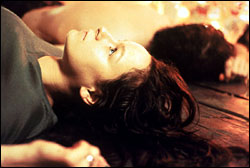Morvern Callar is a suicide movie with some eerie life in it. (It opens Friday, March 28 at the Varsity.) Morvern, whose name means “quieter silence,” is a silence-prone Glasgow party girl, almost an autistic Parker Posey. Samantha Morton, the head empath in Minority Report, is perfect in this role. Her enormous, dolorous blue eyes could win a stare down with Andy Warhol, and her mouth does two things: closed, it’s like the Greek letter omega, silently bespeaking the end of everything; open, in laughter, it’s anarchic, exposing fangy, irregular teeth. No actor of her generation has come further on fewer words of dialogue than Mortonher deepest empath moments were silent, and she got a Best Supporting Actress Oscar nomination playing a mute in Woody Allen’s Sweet and Lowdown. She’s got that certain blank something to pull it all off.
We meet Morvern Christmas morning. First we hear an intermittent electric hum, then realize it’s the bleak Christmas tree lights flashing on and off, revealing Morvern’s boyfriend lying in a pool of blood. His PC screen implores, “Read me.” His suicide note evinces a minimalist abhorrence of human motive: “Don’t try to understand, it just felt like the right thing to do.” So Morvern does what any soulless party animal would: She leaves him to rot, opens his presents, raids his bank account, fulfills his last request (to send his novel to a publisher . . . although with her name on it), and carries on with life as usual: raves, ecstasy, mindless sex with strangers.
On the page, the film sounds dead empty: Director Lynne Ramsay (Ratcatcher) has trimmed 1995’s minimalist Alan Warner novel to a sub-minimal wraith of itself, removing the life lessons Morvern learns and retaining the stark essence of the story. Morvern spends her nights banishing the banality of her small-town day job (supermarket clerk) with nonstop deafening music and serotonin-scrambling partying with her best friend, Lanna (sparkling first-time actor Kathleen McDermott), then spirits Lanna off for more druggy sex at a Club Med-like youth rutting resort. (They’re funded by Morvern’s dead boyfriend’s credit cards.) It could’ve come off like Scot Girls Gone Wild! Or Morvern & Lana’s Reckless Adventure. Fear not: Fab acting, ace directing, and Alwin Kuchler’s dreamy cinematography make it a full, almost mystical experience.
Warner was part of the Trainspotting literary phenom, but this film’s druggy milieu is a whole new world, utterly distinct from Trainspotting‘s trendsetting ironic style and pub-based characters. When Morvern straps on her Walkman to hear her late boyfriend’s tape (the soundtrack is to die for: Stereolab, the Mamas & the Papas, Lee Hazelwood, Holger Czukay), we step off the firm earth into a spectral parallel universe, horrifying yet weirdly placid. When party kids’ legs or hands shake uncontrollably from ecstasy poisoning, we are cool, unmoved, like Morvern, who’s as implacable as the shiny-eyed denizens of Village of the Damned. When she floats out of a mega-decibel wee-hours rave to the primordial silence of the Scottish seashore, hoists her skirt, and impassively flashes a man on a passing boat, it’s like no youth movie you ever sawmore like David Lynch, only not derivative, quite original. It has some of the look and feel of Breaking the Waves, only mysterious Morvern is no victim but a pitiless victorthe rock on which merely human waves break.
The only thing cooler than this movie is the fact that Ramsay’s next job is adapting Alice Sebold’s The Lovely Bones. See Morvern and you’ll know why she’s the one to capture heaven and earthly hell on celluloid.








